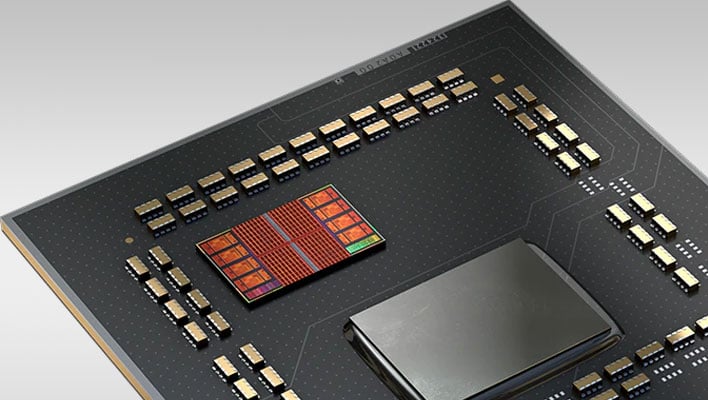AMD Confirms Ryzen 7 5800X3D Will Not Support Overclocking, Here's Why

Did you catch our 2.5 Geeks webcast yesterday? If not, you definitely should—we sat down for a chat with AMD Director of Technical Marketing, Robert Hallock, primarily to take a deep dive into the Ryzen 6000 series based on the Zen 3+ architecture. However, we also touched on other topics, including a definitive answer on whether or not the Ryzen 7 5800X3D supports overclocking.
Spoiler: It does not, and for a good reason. As Hallock explained to us, this is AMD's first implementation of stacked 3D V-cache on a processor and that packaging technology has different voltage and frequency scaling than what some enthusiasts might be accustomed to.
"On the desktop parts, you've seen us ship parts that range up to 1.45 or event 1.5 volts in boost and that is not the limit for 3D V-cache technology. The voltage limit on [3D V-cache technology] is more like 1.3 to 1.35 volts," Hallock explained. "So, we are not going to allow overclocking, CPU core frequency overclocking or core voltage adjustment
The decision was made not to allow CPU core frequency overclocking or core voltage adjustments, as the Ryzen 7 5800X3D already uses and ranges up to the safe frequency and voltage limits and capabilities out of the box. That said, fabric overclocking remains enabled, and so does memory overclocking. So there are still some elements that enthusiasts and overclockers can tinker with on their Ryzen 7 5800X3D build.
While some may be disappointed in this outcome, it actually represents a more aggressive approach by AMD rather than a conservative one. How so? The alternative was to wait on releasing a consumer chip with 3D V-cache until the technology is a bit further along, to where there's more flexibility in user-side tweaks.
"We work very hard to maximize our performance out of the box for and this is a very new thing we're trying with this 3D stacking thing, especially in the consumer space that's never seen it before," Hallock said. "We have a tough choice to make—do we we wait for that technology to mature a little bit on voltage and frequency tolerance, or do we go right now because the technological benefits are so good and people are always asking us, 'Just give me the best gaming chip for my money'. I mean, that's what I want. So, we made the choice, we're going to ship it."
It's a sound decision, and one that's made even better by AMD's recent announcement that it is formally supporting its Ryzen 5000 series CPUs on 300 series chipsets (X370, B350, A320) with its next AGESA update. That specifically includes the Ryzen 7 5800X3D, which AMD claims will deliver a 15 percent performance uplift in games. BIOS updates should start rolling out in May or April.

